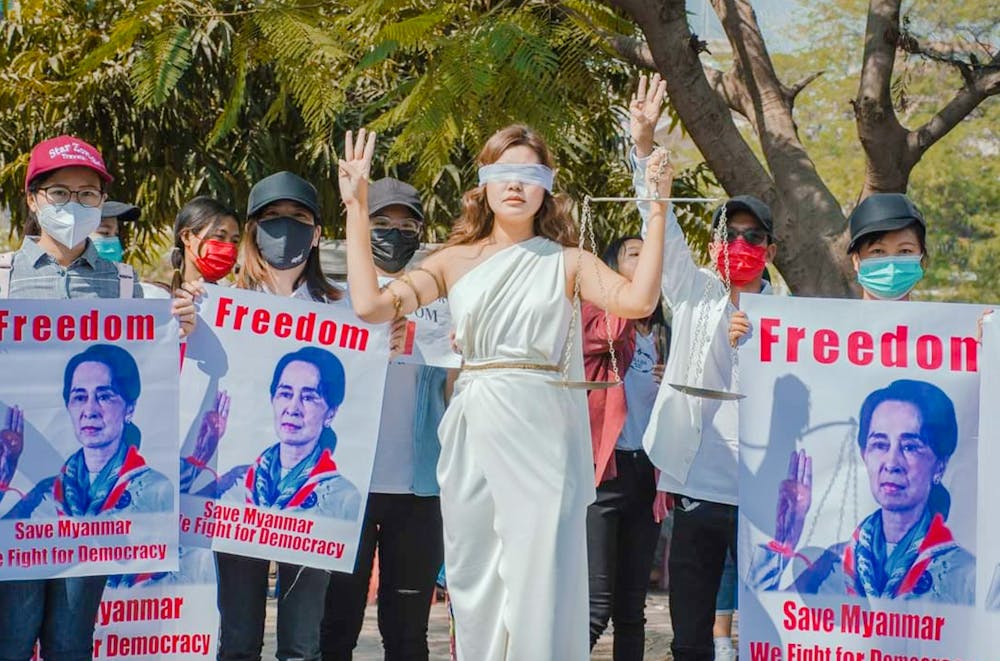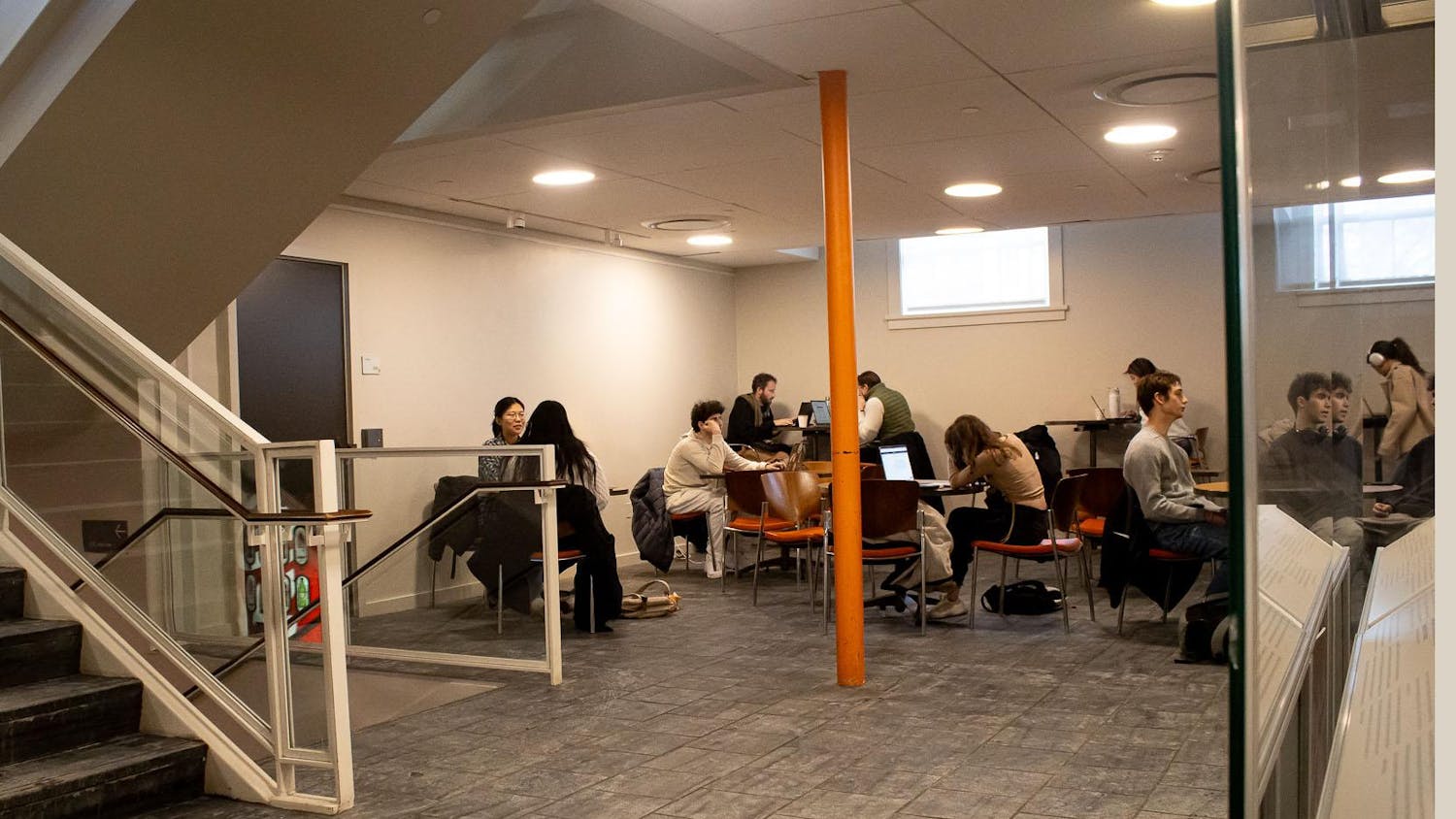On Feb. 1, 2021, Myanmar citizens found their nation in a state of emergency. The military-led by Commander-in-Chief Min Aung Hlaing — staged a coup and overthrew the country’s democratically elected government. Over a year later, University community members said, the effects of the coup are still visible in the everyday lives of the Burmese people.
Myanmar, formerly known as Burma, has been plagued by “military rule, civil war, poor governance and widespread poverty” since it gained independence from colonial rule in 1948, according to the Council on Foreign Relations. The country held its first democratic elections in 2015, which the National League for Democracy party — headed by Aung San Suu Kyi — won. In the 2020 elections, the National League for Democracy party won again.
Many Burmese citizens remember how the installation of a democratic government in 2015 brought a new wave of hope to the country, according to a University community member with ties to Myanmar who requested anonymity due to safety concerns.
“Even during COVID, Myanmar was one of the fastest growing economies of the world,” they said. The Burmese “people had access to everything the world could offer.”
“There was so much excitement … and really visible progress that was made over time,” said Arden Reynolds ’23, who lived in Myanmar from 2014 to 2018 and was present when the first democratic elections were held. “There were so many signs of new industries, new people coming in and economic growth.”
In 2021, the results of the country’s second election were contested by the military on the grounds of fraud, leading to the coup in February. Today, the Myanmar military remains in power and has committed atrocities, including the detainment of hundreds of children and acts of genocide against the Rohingya ethnic minority.
“Life is completely different before the coup and after the coup,” the anonymous source said.
“It’s so scary to think of how easily (the democracy) was able to tumble and a handful of people were able to take complete control,” Reynolds added.
Most of the expat community was “evacuated by their home countries,” according to Ashley Dun GS, a second-generation Burmese American. At threat of persecution, some freelance journalists fled to neighboring Thailand, she added.
But, the anonymous source said, nothing was more frightening than the daily lives of those left behind.
“Military trucks just pass by and are patrolling the streets everywhere. They have the right to arrest, shoot (and) kill anyone they please, … and the law is the bullet for them,” they added. “Just last week, there was a story that a soldier arrested a three-year-old kid.”
The violence in Myanmar has been exacerbated by retaliation from the People’s Defense Forces — local militias which some deem to be “the armed legitimate force of the elected government,” according to the anonymous source.
“This has catapulted the nation into a civil war. All across Myanmar, … there are bombings every day, drive-by shootings between the resistance forces and the (military) soldiers,” the anonymous source added. “It has completely changed the landscape of Myanmar.”
Regular electricity blackouts and government surveillance of social media sites have also contributed to national anxieties, Reynolds said.
“People cannot speak out openly unless they want to get arrested,” the anonymous source said. “Not only that, (the military) will arrest family members and nationalize all (your) properties.”
Even though protests are banned, Burmese citizens have found ways to demonstrate against the military rule. There are regions of Myanmar under the control of “revolutionary armed forces” and guerilla flash protests still take place, according to the anonymous source.
The anonymous source added that they have started relying on VPNs to access the internet and apps such as Facebook, Twitter and Telegram as a means of updating fellow residents about military actions throughout the country.
“In this day and age, citizen journalism is extremely important,” they said. “Citizens report what’s going on. … (If) there’s a shooting two blocks away from my house, I can see the video of it in five minutes.”
“There was such a huge mobilization from activists, journalists, artists and mostly young people all across the country that was really exciting,” Reynolds said.
Reynolds said some are frustrated by the lack of media coverage of these protests outside of Myanmar. If “people saw how much the citizens didn’t want (the coup), governments might have taken stronger actions right away and that might have done something,” she said.
While the coup has threatened the safety of many citizens of Myanmar, the military’s persecution of the Rohingya community began several years before the coup.
“The Rohingya are not recognized as an indigenous people to Myanmar, but they’ve lived in the Rakhine or Arakan state for a very long time,” said Dun, whose dissertation focuses on contemporary American literature from the Myanmar diaspora.
While the coup hurts everyone, she added, “I think there’s a sense among certain religious and ethnic minorities that … they’ve always had to be concerned about military persecution.”
The military crackdown on the Rohingya community in Myanmar began in 2017, when thousands of members of the Rohingya community fled to neighboring countries, including Bangladesh.
It was during a trip to Bangladesh in 2017 that Ruhul Abid, associate professor at the Warren Alpert Medical School, witnessed the refugee crisis firsthand. He decided to provide healthcare for the refugee community through his Bangladesh-based volunteer organization, Health and Education for All.
“When we first went there, … people were still crossing the border,” he said. “A family with five women and young kids said that the male members were killed. … The boy showed us a bullet wound in his leg, … and two of the women (had been) sexually assaulted. … It was a really, really bad situation.”
Because the Rohingya people were stripped of their Burmese citizenship in 1982, “the whole population — two generations — were without immunizations,” Abid added. “They didn’t have access to any medical care and were encamped in some places in the Rakhine state.”
Abid said he remains doubtful of any change in the plight of the Rohingya today. “There have been many conversations between the (United Nations), Bangladesh government and Myanmar government (about the Rohingya’s conditions). Aung San Suu Kyi underwent a trial, but nothing happened,” he added. “If you asked me what changed after the coup, the plain and simple answer is that nothing changed … for the Rohingya refugees.”
Despite the Biden aministration’s recent declaration that Myanmar’s military has committed a genocide against the Rohingya minority, the future of the country — and international intervention — remains uncertain.
“Some people are very optimistic and others are very pessimistic,” Dun said. “This is certainly not the first time there’s been a coup in Myanmar's history and a violent putting-down of resistance.”
“A lot of people who have lived through the (previous) violence, … older people or those who belong to ethnic minority communities, … think this is a repetition of Myanmar’s history,” she added. “But a lot of people … still want to support activists and politicians who are united against the military, and there’s still a lot of support for the NLD government.”
Reynolds believes that pressure from China could have an impact on the situation.
“The activism is incredible, but it’s also faced with horrific retaliation,” she said. “Without pressure from China, Myanmar’s biggest trade ally, I don’t think much is going to happen.”
“It’s really important for the international communities to be centering Burmese citizens themselves … and asking what support looks like for them,” Reynolds added. “There’s always an attempt by big global powerhouses like the U.S. to think they know what’s best for other countries.”
“If you’re going to be imposing a global policy or sanction on Myanmar, (it is important to think about) who that is really affecting,” she said. “Because it’s not affecting the generals.”
Correction: A previous version of this article misspelled Arden Reynolds’ first name and misstated Ashley Dun’s last name. The Herald regrets the errors.





